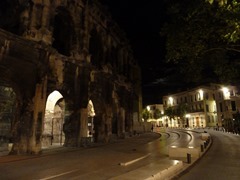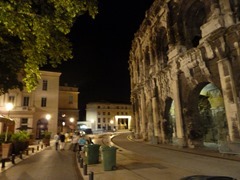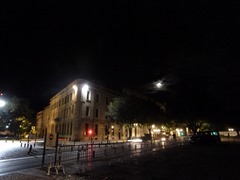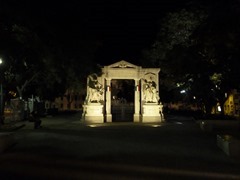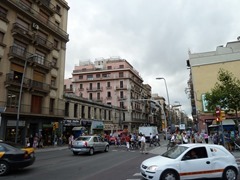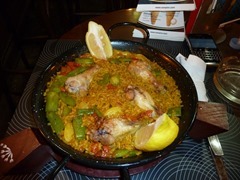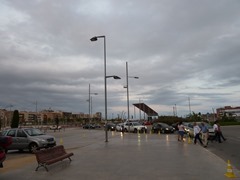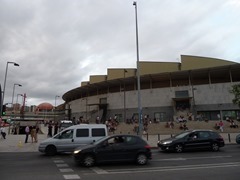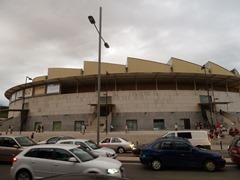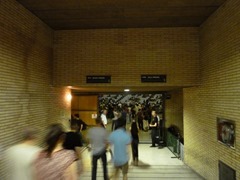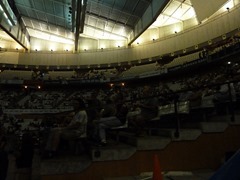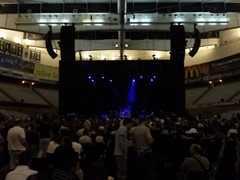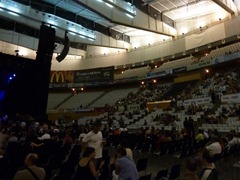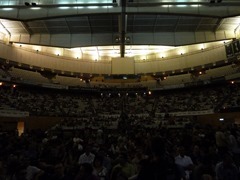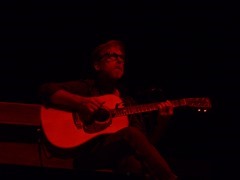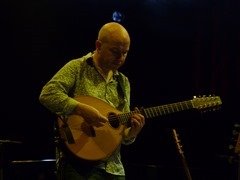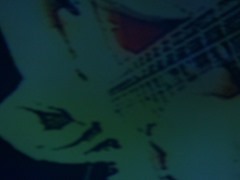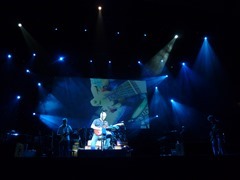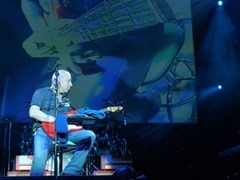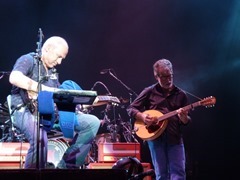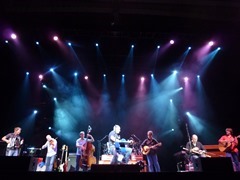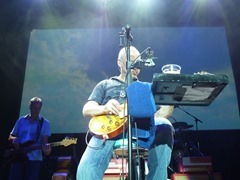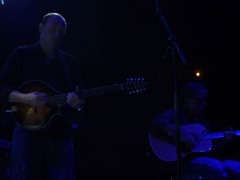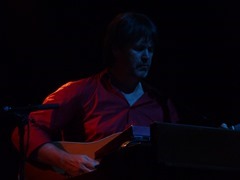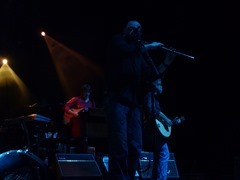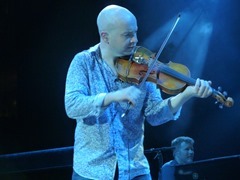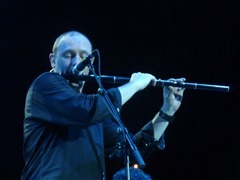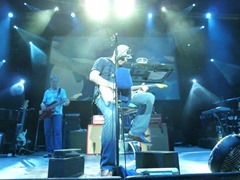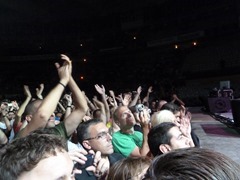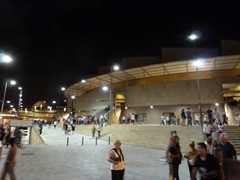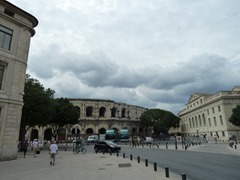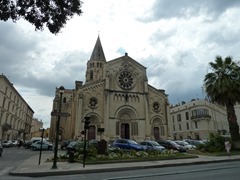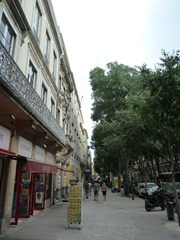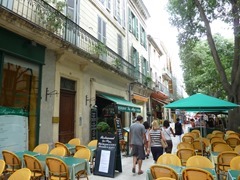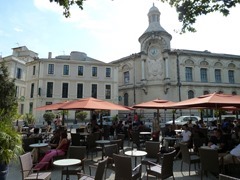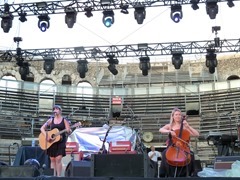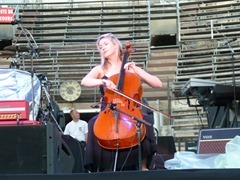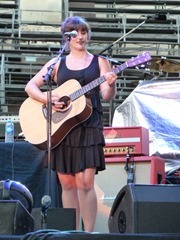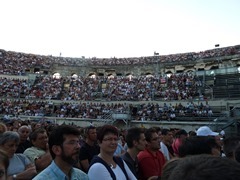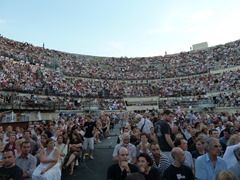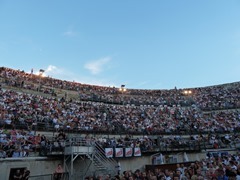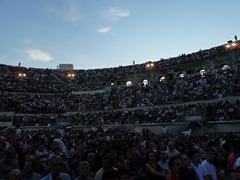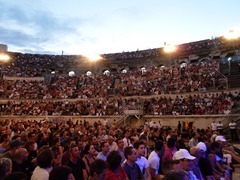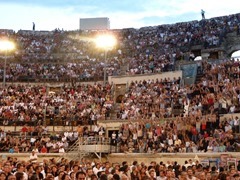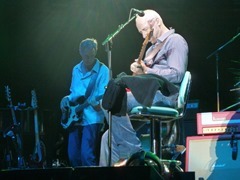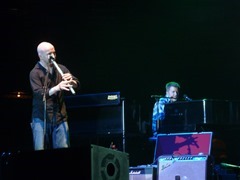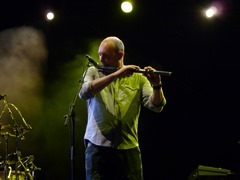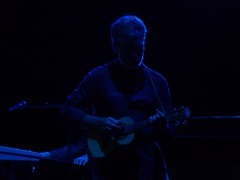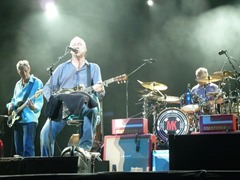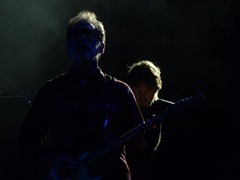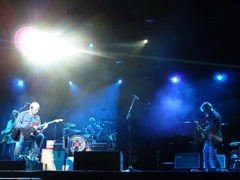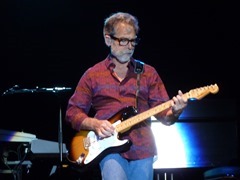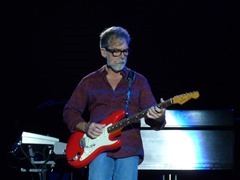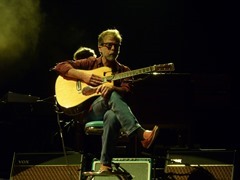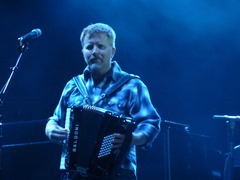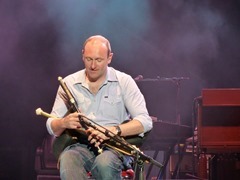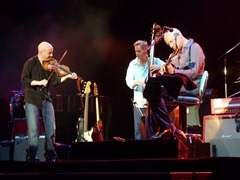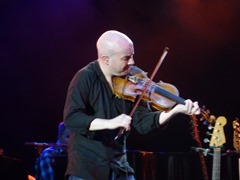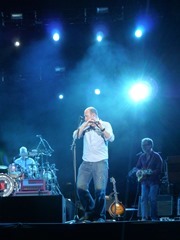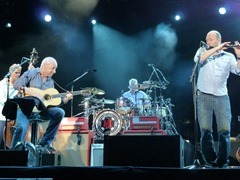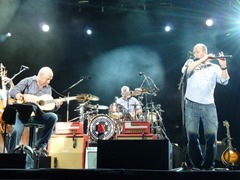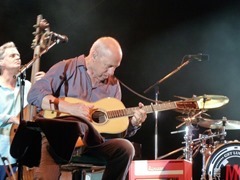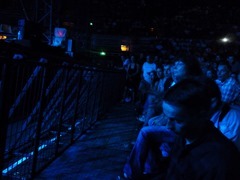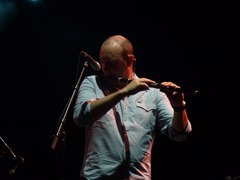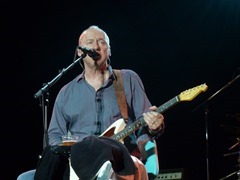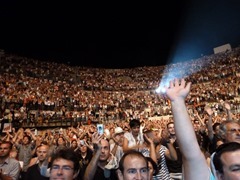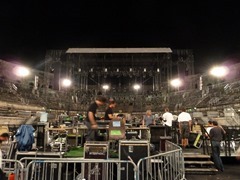Before I go on to describe my first day in Spain, here are a few photos that were accidentally omitted from the post about my day in Nîmes. I took those photos after downloading images from my camera onto my laptop, and I think they’re worth being included.
Outside the arena, at night:
Late dinner was consumed at Le Petit Bofinger, a Brasserie just outside the venue. Steak at 12:30am.
On my way back to the hotel:
Just under five hours of sleep in Nîmes, France clearly were not enough as I woke up at 6:00am a bit on the off‐side. Luckily, though, my hotel was so close to the train station I could probably have reached it had I swung a Telecaster with full power—train was leaving at 6:30am. I got used to waking up and being on a train within the span of 30 minutes; I don’t know if this is something to be proud of, though—I somewhat miss simpler times.
A few days ago, Brigitte, an AFMK member, suggested that I hitch a ride with her to Barcelona from Nîmes; I decided to pass because I usually use train‐riding time for blogging, and I cannot possibly use my laptop while in a car for more than 5 minutes without getting sick. However, just before going to sleep, I took another look at the schedule and realized something very troubling: the 6:30am train leaving Nîmes arrives at Montpellier at 7:17am; the connecting train to Barcelona leaves 10 minutes later, and if I miss it, we’re talking about five hours delay in getting to Barcelona.
Quite the risky connection; unfortunately, I did not carry Brigitte’s phone number, so I had to go to sleep with fears in my mind mixed with belief that, after all, everything’s going to be alright.
I was happy, then, to find out that the first train ride was smooth as silk; arrived at Montpellier on‐time and parked my bottom on my reserved first‐class seat at the train to Barcelona. Woo‐hoo.
The particular first‐class coach I was seated at was designated as a quiet zone. Quiet zone my ass—I actually have never witnessed any “quiet zone” that was really quiet, not even in Germany where people tend to obey this sort of things. The train ride to Barcelona was actually of the worst ones when it comes to noise: the Spanish people aren’t well known for their aversion to chatter. Any group of 2 people or more seemed to find an endless number of topics to talk about, during the entire ride.
That made me wish that the Spanish language would have a few more consonants, if that’s what it takes to make these people just SHUT THE FUCK UP even for a microsecond.
Attempts to doze‐off during the five hours train ride went mostly unsuccessful; I took comfort in the fact that I was going to arrive to Barcelona about 10 hours before the concert’s start time, which leaves more than enough time for sleep.
One good things in having my eyes open, though, was the view: the train ride from Montpellier to Barcelona rides very close to the Mediterranean Sea, and the sea is often in view. A few cliffs along the way, together with the sea, gives one the will and passion to jump through the window and just get lost there.
Spain… The final frontier. That’s where this tour is going to end. As a matter of fact, Spain / Portugal has been the “scariest” part of this tour for me, for two reasons.
First, the language barrier. The people in Spain and Portugal aren’t exactly the best English speakers out there, and I couldn’t speak Spanish even if my life depended on it.
Second, it’s the travel. Train travel in Spain—at least when going through distances such as those I am about to take—is nowhere near as convenient as in, say, Germany. Julio Bricio is the guy I owe so much for, for helping me plan the Spain / Portugal part without having to rent a car and drive my ass off for a week; still, we’re talking about three trains, two bus rides, 4 (!) flights and a one‐day car rental over the course of one week. The last push, as it turns out, isn’t necessarily the easiest.
The one‐day car rental is required to get from Madrid to Gredos, at the last day. I have a flight scheduled from Bilbao to Madrid early in the morning, and planning on renting a car in Madrid for the day, because there are absolutely no public transport links to get me to Gredos on time. If someone here is reading this, and is doing the drive from Bilbao to Gredos (or from Madrid to Gredos), I will be happy to share costs if I could hitch a ride.
30 minutes past schedule, I finally arrived at Barcelona‐Sants, which is Barcelona’s main train station. Welcome, Isaac, to Spain.
Lets get one thing out in the clear, now. I have been travelling for such a long while now, seen how things work (or don’t work; Poland, I still remember) in different countries, overcame obstacles here and there—so I have a pretty good idea of what pisses me off and what doesn’t; one thing that pisses me off is that I have to waste time due to (other people’s) ignorance.
Arriving at Barcelona‐Sants and taking the escalator up, I was presented with what seemed to be a pretty modern train station. I was initially impressed; the train station looks more like an airport terminal, with lots of space, lots of service counters…
But as I said a few times before, things tend to get annoying sometimes, and the most annoying things are those that happen unexpectedly. All I wanted to do there was to make three train reservations (to get this task over with already) and take the subway to my hotel.
That took almost two hours.
First thing I did was to take a look at the automated ticketing machines. As I have a travel pass, all I need really are seat reservations; not all automated ticketing machines provide reservation‐only transactions (the ones in Germany do; then again, Germany is by far the easiest country to train‐travel in. Comparing Spain to Germany in that respect is outright unfair), so I decided to look into it and potentially save some time.
Three types of machines, each doing something different and, unless you can read Spanish, you can’t do anything with them. Hell, you can’t even know which machine is good for what purpose: Bus tickets? Train tickets? Subway tickets? Who the fuck knows.
I ended up trying one of those machines, and was thrilled to somehow locate a button that would change the interface language to English.
I pressed that button as enthusiastically as pressing a button could be. Now you would expect that all information on the screen would be automatically translated to English, right? HA HA. Think again. The only things that changed were the “Continue” and “Back” button captions. All ticketing options remained the same, in Spanish.
Baffled by the sheer amount of stupidity exerted by whoever were the moronic life forms who designed these machines, I went to the counters. There are about 20 of them, segregated into groups. Each group has a sign on top of it, in two languages—NEITHER ONE IS ENGLISH. I somehow managed to figure out that there were two groups of counters—“long distance” and “not long distance”. Now what the hell does that mean? What is “long distance”? Do they mean “international”? Again, who the fuck knows.
Still baffled, I then noticed a machine in which you have to press a button to get a ticket with your number in line written on it. Got #395, and humanoid #322 was just being served. Great.
So I decided to use this dead time to see whether I’m really doing the right thing. Noticed a small “Customer Service” booth. Yes, they had a title in English! Line‐up of about 10 people. Waited for my turn and asked the attendant a very simple question.
– “Hello. I have a EURail travel pass. Where do I make seat reservations?”
She looked at me with an expression on her face that demonstrated complete and utter confidence in what she was about to say.
– “Travel pass, counters 22 to 26. No need for number.”
NICE! No need for number—that’s good. There I go, dead tired and starving, to the line‐up for those counters. Line‐up as long as the Nile, but hey, what can you do? Stood there for just about 30 minutes or so—and that was about an hour after arriving at the station. Five counters, only two are manned. One counter served one particular lady for more than 20 (!) minutes.
As my turn arrived, two schmucks arrived to the line‐up and started annoying people around me. I couldn’t understand anything of what was said, but by the tone of it and the body language, I understood that those two idiots wanted to cut to the head of the line, much to the disproval of everybody behind me. As my turn approached, one of the idiots approached me and mumbled something in Spanish.
– “Sorry, I only speak English.”
He gave me the look as if he was just prepared to step on me as if I was a cockroach, mumbled some other things in a very rude tone and, as my turn arrived, was already on his way to cut in front of me. I gave him a look that could only be interpreted as “you better get your ass out of here”; that seemed to work. Finally, I’m at the counter.
– “Speaking English?”, I asked.
– “A little.”
Good. We’re past obstacle number 1.
– “I would like to make three train reservations.”
– “OK, which ones?”
Fired‐up my BlackBerry, and started reading him the three routes, including dates, departure times and even train numbers.
He smiled.
– “Oh. So, three train reservations in Spain. That’s very easy…”
I smiled. You know, the kind of smile you used to have on your face when you were a kid at school and your teacher singled you out for doing something positive, or better than other people. Story of me growing up, but hey, that’s not the time for bragging. I felt pride in my organizational skills, and how I have everything jotted down right to the T.
And then he went on.
– “… That would be counters 11 to 16.”
If my 70L backpack had eyes, it would probably look at the attendant with the very same puzzled look as I looked at him.
My explanation to him that I was told to come and see him didn’t help. He claimed that he has no way of making any reservation, and he’s only there to provide information and maps to travellers. I was so upset that I just turned my back to him and left the scene while he was still talking.
Ticket #395 was still in my hand. Rushed back to those counters; number #402 was being served.
FUCK YOU, BARCELONA‐SANTS, I wanted to scream. Deep breath, took another number and tried figuring out what to do next. I was starving, and my dreams of having proper Spanish lunch faded into oblivion. A short hop to a cafe at the station, and I had a disgusting sandwich, even more disgusting “dessert” and a cappuccino that must not, and I repeat, MUST NOT be called “cappuccino” as it is simply an insult to worldwide coffee. One sip and I had to throw it out.
Still some time for my turn, so I decided to look around and do whatever I need to do to get on the subway. Got familiarized with the subway system here (very clear and efficient), bought a day‐pass and back to the seated area, blogging away.
My turn arrived, and I sprang off my seat as if I wasn’t carrying any 17kg backpack. The entire transaction took three minutes and I fled the scene. Down to the subway, three stops to Collblanc and I was out in the open air, finally, in Barcelona.
Barcelona (Wikipedia: http://en.wikipedia.org/wiki/Barcelona) is the capital city of Catalonia, which is an autonomous community—some may call it a “state” or a “province”—in Spain. It is the second largest city in Spain after Madrid and its metro area is home for around 5 million people.
Barcelona is one of the most toured city in Europe (ranked 4th after London, Paris and Rome) with about 5 million tourists annually, flocking its historical sites and, of course, the beaches. It’s very warm in here, as in most Mediterranean countries: summer lasts six (!) months and it’s not uncommon for the temperature to cross 20℃ during the winter.
After finally being in the city, Task number 2 involved getting a mobile broadband USB stick. I will be spending quite some time travelling in Spain so having Internet connection handy is a useful thing. Located a Vodafone store, and there went another 30 minutes before everything was said and done. I didn’t have much power left in me when I left and started to walk up the street towards my hotel—Hotel Senator; once arrived, I was very pleased to be in a normal 4‐star hotel with a comfortable room; quick shower and went to rest for a while—that is, for a few hours.
That explains why I didn’t really get the chance to explore Barcelona. My flight back to Canada is scheduled to depart Barcelona’s airport on August 7, as I figured I might need a few days of rest before going back home; initially I was thinking about spending a few days in Palma de‐Mallorca; now I’m rethinking that. Maybe will stay in Barcelona for a few days instead?
If anybody has suggestions what I should do between August 1 and August 7, let me know; the only condition is that I have to be in Barcelona on August 7 to catch my flight back.
I don’t know. Like some band members, I too prefer not thinking about “the day after” at this stage, even though it’s just one week away.
ONE WEEK AWAY. Where did the last four months go?!
At around 6:00pm, I left the hotel seeking for something to eat. Time was my friend; the concert in Barcelona was going to be a seated concert, so no stupid line‐ups to attend to. Took the subway to Placa de Sants and started wandering around.
I should tell you though that, in sharp contrast to Barcelona‐Sants, Barcelona’s subway system is as clear as Trento’s tap water. That is, very clear. You cannot possibly get lost, no matter what language you can read or not read. One of the best subway systems I encountered—and that includes the trains themselves, very spacious, comfortable and air‐conditioned.
Something here felt very familiar. After about 15 seconds trying to pinpoint it, I reached the conclusion: the atmosphere here in Barcelona is almost exactly the same as the Tel‐Aviv area, where I grew up. The look on people’s faces as they wander the streets, always looking busy; the non‐existent personal space you have while walking around or even sitting in a restaurant; the tone in which they speak; the informality that reflects out of everything they say (the way they say it; I can’t make sense of Spanish), every movement of every limb—even the look in their eyes.
This is Tel‐Aviv, speaking Spanish. Had I been able to speak Spanish, I’d feel at home here.
Walking down Carrer de Sants, which is a main shopping avenue not far from Barcelona‐Sants, many shops are open but finding a place to have a proper meal is tricky. Spain (at least this part of the country, but I have some belief that it’s true country‐wide), like France, is a country where you have to be at the restaurant in just the right time in order to get a meal. Between standard meal times, you can get tapas, or snacks, drinks, things like that—but not a proper menu.
Situation here is even worse for the tourist—dinners in restaurants are served at around 8:00pm, if not later. Took me a while, as well as a few entrances and exits into and out of restaurants, to finally find a cafe that would serve something heavier than snacks.
Paella (Wikipedia: http://en.wikipedia.org/wiki/Paella) is a traditional Spanish dish, originated in Valencia. Usually served with seafood, but I preferred the chicken variant. Here’s what it looked like:
It looks good, doesn’t it? Well, it tasted OK. Not the greatest; I should try this out in a proper restaurant. People tell me I should go to Valencia. Perhaps I will.
Knowing that the venue is about 17km away from where I was, I decided to not take any chances and headed to the venue. Altogether about 16 subway stops over two subway lines—all the way to Badalona.
The Pavelló Olímpic de Badalona (Wikipedia: http://en.wikipedia.org/wiki/Pavell%C3%B3_Ol%C3%ADmpic_de_Badalona) is not actually located in Barcelona, but in Badalona which is neighbouring city north‐east of Barcelona. The real name of the venue is “Palau Municipal d’Esports de Badalona”, but “Pavelló Olímpic de Badalona” is the name it’s usually referred by. The venue holds up to 12,500 spectators and is usually used for basketball games.
It’s been a cloudy day almost all day long, and the evening was no exception.
Not a lot to see around the venue—quite a boring area if you ask me.
Finding the markknopfler.com ticket collection desk was very easy—right at the entrance. Only problem was that, once you collected the ticket, you had to enter the venue; no way out. So I decided to grab something to eat before.
Right across the road, there were a few kiosks, or mini‐restaurants, selling what Spanish people consider “snacks”. Definitely not full‐fledged dinners; those snacks usually involve dough, cheese, ham, sometimes even tuna; something to make you fat and fill your stomach until the real dinner is ready.
It was then when I had my next encounter with the language barrier. First of all, while waiting in line, I looked at the blackboard showing the menu and couldn’t make sense of anything. I wanted a hot sandwich, didn’t matter which kind—and had no idea what to say or how to say it. Took me and the cashier about a minute of two one‐sided conversations—myself in English, her in Spanish—until someone who speaks both languages decided to take us out of our misery.
I don’t even know what was inside the sandwich. Demolished it as if it was nothing and went to the venue. Really, nothing much more than a basketball arena.
A few more pictures for you…
… You get the idea.
My ticket brought me back to where I belong: front row, dead‐centre. To my right, Brigitte was sitting along with a few more AFMK members. It was the last show for them this tour, I could see the excitement on their faces.
I wrote before that each concert serves like a “balancing point”: no matter how crazy and insane the day has been so far, when I see the concert, everything goes back to equilibrium mode. Meeting familiar faces also has that effect, therefore I was happy to see the AFMK members. Mikel, a Spanish fan whom I met before elsewhere, was also there.
A few minutes past 10:00pm, the band took the stage and played their first concert in Spain this tour.
So, a few words, first, about the Spanish fans. Very similar to the Italians, when it comes to enthusiasm. These people here are quite vocal, I tell you. Deafening cheers throughout the concert made the experience quite lovely.
Exactly the same setlist as in Nîmes—same fourteen songs with no particularly notable events. Looking at the band, you could see once again the connection between the feedback they get from the audience to the happiness on their faces and their eagerness to play.
It was the first time in a while that the backdrop was used. Romeo and Juliet, the first massive cheers extractor in the setlist… immense cheers.
Sultans of Swing followed, prompting the entire audience to stand on their feet cheering for some long moments as the band got prepared to play Done with Bonaparte. It was then when the “oe‐oe‐oe‐oo” routine was sung by the audience. I was curious to see where it would lead, as the band was no longer in the Sultans of Swing outfit, which meant Mark couldn’t lead with his Stratocaster.
No worries, though. Glenn to the rescue with awesome upright bass work, with John working the violin with the rhythm. Mark himself didn’t do much—a shame, I was looking forward to see how he can lead this “song” with the National guitar. Instead, he chose to imitate running, swinging his hands back and forth.
Marbletown followed and this time we were for a somewhat “attacking” jam session. Something there just sounded a bit too loud to my taste, but one thing I should note was that there was some intensive acoustic guitar work played by Mark—some finger work I haven’t yet seen him performing.
Deafening version of Speedway at Nazareth, followed by equally‐deafening cheers; Telegraph Road followed with a killer outro solo, leading to the Running of the Bulls—the first Running in the country where the Running of the Bulls is actually practiced (Wikipedia: http://en.wikipedia.org/wiki/Running_of_the_bulls; a more stupid exhibition I cannot imagine). We were all attached to the stage all the way to the end of the concert.
As I wrote above, personal space is a non‐existent thing in Spain, especially when you’re in a concert, at the front, with thousands of passionate sweaty people. My shoulder was used as a tripod for someone who insisted filming the entire encore right in front of Mark’s face.
Someone there almost started a fight, too. I think there was quite a bit of shoving and pushing activity around.
The frantic audience then welcomed the band for the third encore—Piper to the End, excellent performance.
As usual, here are a couple of pictures of what it looked like being in my position at the end of the concert. Lots of happy people.
Concert was over two hours after it started; bid the AFMK members goodbye and fled the scene, to get as much sleep as I can before a long travel day to Murcia.
One of the things that have been bothering me recently was that ever since the Locarno concert there were no comments posted in this blog. I expected, at least, for the odd negative comment here and there and once those stopped coming, I realized something must be wrong. I thought about it on my way back to the hotel, and decided to look into it.
Logged in to blogger.com (which provides the framework for this blog) and, lo and behold, 19 comments awaiting moderation. Ever since I turned on comment moderation to fight spam, I was not receiving any notification about new “pending” comments—blogger.com actually expected me to log into my account to see those comments and moderate them through the web interface.
That has been fixed right on the spot and everything’s back to normal again. Thanks for all the comments, positive and negative alike.
That took about an hour to work through, as well as posting replies… and a very late night sleep after an already long day.
Signing‐off this post from my hotel room in Murcia.
Later,
Isaac
